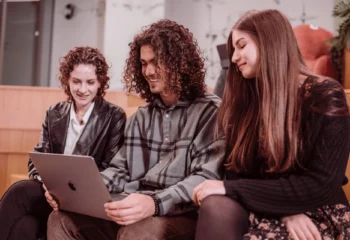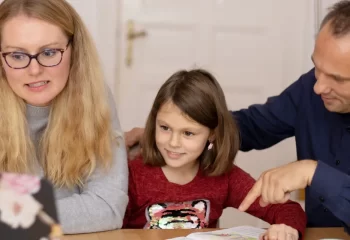Ruxandra Mercea, Executive Headteacher of Spark School and founder of the Wellbeing Institute:
“The most important thing that the teachers can do while they are meeting online with the students is to connect with them emotionally”
The Importance of Routines
An important tip for teachers is to clearly set their daily routines with the children and follow them consistently.
Morning Routines
For example, tutors can set up a live online meeting with the students, early in the morning, to ask them how they feel, what worked well for them the previous day. Even if you are a specialist/subject teacher, it’s best to start the lesson with a brief check-in moment which will help students of all ages feel connected.
The Practice of Gratitude
Once that emotional connection is established, children can better focus their attention and they can be more engaged in school work. During difficult times like these, teachers can also integrate the practice of gratitude in the check-in moment. Children need to look at the things that work and are good in their lives before they start with what is difficult.
End-of-day Routines
It is useful if the check-in routine is repeated at the end of the day, with the same discussion – what worked during the day, how do they feel and what plans do they have for the afternoon. Instead of having one meeting a week with the class, tutors can schedule 20-minute intervals throughout the week, so they can have daily interactions with them. My advice is to allocate 20 minutes every day to meet online, to give students an opportunity to be heard, to share what they’ve been doing, why they’re grateful, what has worked and what hasn’t worked well for them.
Emotional Support for Teachers
I think it’s important for teachers to seek emotional support, to recharge and replenish their resources because teaching online is more tiring than being physically present with the children. Teachers also need support, they can benefit from discussing their challenges with another adult who can hear them out. It also helps not to dwell on worries or stay in an area of concern for a long time, but instead, allocate a specific time for allowing ourselves to feel the worries and acknowledge any concerning thoughts we might have.
We can choose to spend less time reading the news less or even decide not to follow the news at all, or to stop the apps’ notifications and so on.
Setting Realistic Expectations
Teachers should also set realistic expectations in regard to how much of the curriculum can be covered while teaching online compared to teaching in class. They can shift their paradigm and, instead of focusing on solely teaching the subject, consider what important skills the child could develop in the next six weeks.
The most important thing that the teachers can do while they are meeting online with the students is to connect with them emotionally. Going through a large number of exercises and focusing on covering a lot of material are unrealistic expectations that pull everyone in a vicious circle, not a virtuous one.
Children and Parents Relationship
As far as parents are concerned, it is very important for them to spend special time* with their children every day (*dedicated 1:1 time, uninterrupted by calls and without technology). The fact that parents sit next to their children while they do homework is not a special time.
If there are several children in the family, there should be a special time for each of them. And make it fun! We know that adults and children need to relax during this period, so the special time is what brings laughter and joy to the family. We tell jokes, we go outside for walks, as a family, and we take care of each other.
Dealing with stress
It is also important for parents to dedicate time to their partner, to the relationship, if they are in a couple. A crisis can help us to discover ourselves better than any other period. For example, we may find ourselves shouting at someone in the family. It’s a moment to pause and realise that it’s not really the family member who made us angry, it’s something in us, a trigger that we can be curious to learn more about so that we can choose to have a different reaction in the future.
It is more valuable to express our fears, needs to another adult than to think that we are protecting the other by not saying anything. So, let’s not hesitate, we, the parents, to express to each other the worries, the anxieties. And let’s look for support. I think this is a time to refocus relationships, friendships, and then we can support our children. If we think we are heroes by sacrificing ourselves and by working hard, then – tough luck! Children will lose, we will lose, everyone will lose.
Holding children accountable
It also helps to write a list of everything we do as parents right now and decide as a family, what the children may be able to do, from that list. What can they do, out of everything you do as a parent? It is an extraordinary context, which provides opportunities to hold children accountable. It may be slightly difficult to do now, but the children will gain in the long run, in terms of their independence and autonomy. One of the rules we have implemented in our family is that the child first tries everything in his or her power to accomplish what needs to be done, without calling me from the other room for every simple task. For example, can he take his own spoon for cereal? Can he get his cereal bowl in the morning? Can he dress by himself? Can he get ready for school without me reminding him 100 times? Can he do his homework? Let’s look at the whole list of things we do as a family, at home, from cooking to making the beds or taking care of pets. And let’s agree with the child or with the children what they can do to contribute, step by step.




